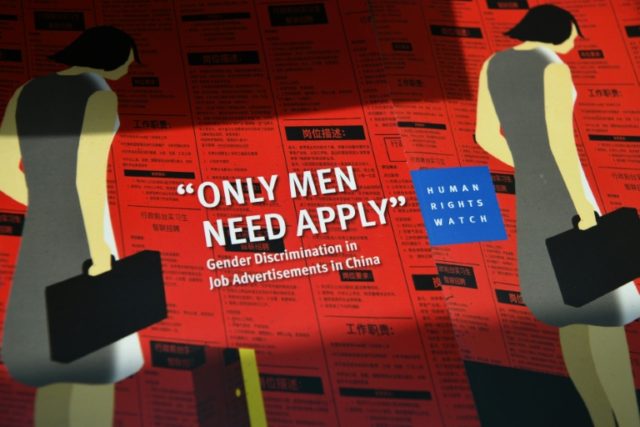In a report published on Monday, Human Rights Watch excoriated Chinese companies and government agencies for using sexist job advertising to maintain a dramatic imbalance between men and women in the workforce.
The report quotes job listings that explicitly state men are required or preferred, plus ads that lure male applicants by promising “goddesses” or “beautiful girls” as co-workers.
This is not a matter of cherry-picking a few appalling job ads to conjure a false image of “Mad Men”-style hijinks in the Chinese tech sector. Human Rights Watch notes that 13 percent of civil service job postings in 2017 specified “men only,” “men preferred,” or “suitable men,” and the total rose to 19 percent in 2018. 55 percent of the jobs listed by the Ministry of Public Security specified that only men need apply.
In cases where women are allowed to apply for jobs, the posting often specifies that they must be married, or even married with children. This is presumably intended to cut down on office romances and reduce the chances of a female employee becoming pregnant and requiring maternity leave.
“Sexual objectification of women—treating women as a mere object of sexual desire—is prevalent in Chinese job advertising,” the report notes. This includes height and weight specifications irrelevant to the job duties, to ensure that only shapely women will apply, and even requirements for “good skin tone,” “no incurable skin conditions,” and other conditions meant to ensure that female staff will be pleasing to the male eye.
Once a bevy of beauties has been secured for the office, Chinese companies are not shy about using them to lure male applicants:
Some job postings use the physical attributes of women—often with photos of the company’s current employees – to attract male applicants. In recent years China’s biggest technology companies, such as Tencent, Baidu, and Alibaba, have repeatedly published recruitment ads boasting that there are “beautiful girls” (美女) or “goddesses” (女神) working for the companies.
A Tencent male employee is featured stating this is the primary reason he joined Tencent and a Baidu male employee saying it is one reason why he is “so happy every day” at work. Alibaba’s recruitment social media account posted at midnight a series of photos of several young female employees and described them as “late night benefits.”
Some ads are written from the perspective that only men would be interested in the position. For example, a 2015 job fair was promoted by telecom giant Huawei as follows: “Do you want your wages to increase at a rate faster than housing prices, and to marry a fair-skinned, rich, and beautiful [woman] and enter the peak of your life?”
A 2012 campus recruitment poster from website Meituan transmitted the same message in a less subtle manner, depicting a woman with her underwear hanging around her calves and declaring, “Finding a job = finding a woman. Do what you want to do the most.” HRW notes that the word “do” has a “connotation of sexual intercourse” in Chinese.
Human Rights Watch adds that some sexual discrimination is more constructively intended to bring more men into professions that tend to be dominated by women, such as kindergarten teachers.
In the event that Chinese women protest these imbalances, the Chinese government aggressively silences troublemakers and intimidates or imprisons protesters. Reuters reported on Monday that Chinese university administrators are cracking down on the nascent “#MeToo” movement among students, forcing them to delete their social media posts and sign written guarantees that they will refrain from further activism.
Many of the companies cited for abusive practices in the Human Rights Watch report boast in public about their commitment to “equal opportunity regardless of gender.” Confronted with HRW’s findings, their spokespeople responded with vague assurances that investigations are ongoing, or simply denied that they have a discrimination problem at all. Some tech firms were more contrite and promised to do better in the future, or claimed they have already taken steps to eliminate sexist job listings.
Laws against discrimination in China are vague, enforcement is lax, and the penalties assessed against offending companies are absurdly small on the few occasions when a complaint actually makes it to court. The report cites examples where the judgment awarded to victims of sexual discrimination was as low as $300 in U.S. currency.

COMMENTS
Please let us know if you're having issues with commenting.